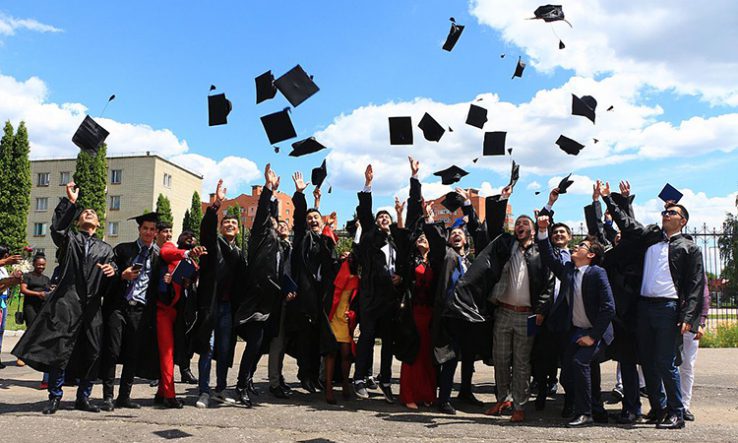
Image: Magister danko [CC BY-SA 4.0] via Wikimedia Commons
Former vice-chancellor hopes great online teaching will keep international students committed to UK
There has never been a time such as this. Our cities and streets are eerily silent, school playgrounds are empty and our universities are ominously still.
It is for the most important of reasons, of course, but we are beginning to realise that things might not return to normality anytime soon. In particular, it may take a while before international students feel safe enough or have the permission to travel to study again.
A new analysis from the Institute for Fiscal Studies shows that the fee income from international students was nearly £7 billion last year, around 17 per cent of the total income of the sector (37 per cent of total fee income). If the current Covid-19 crisis results in a significant drop in international students it could mean major financial problems for UK universities.
The risks for all parts of higher education are huge as those with most to lose from a dip in international students scramble to fill the gap with domestic students, which in turn will hit those universities most reliant on income from home undergraduates.
It is a reminder of just how much of the strength of UK universities has been built on the commitment to education of parents in Beijing and New Delhi. So, what is going to happen to our colleges and universities without international students in the months ahead?
Abroad thoughts from home
Many of the medics, pharmacists, nurses and health care workers on the front line against coronavirus came to this country first as international students. How many student doctors are even now working for the NHS while paying international student fees?
For some, such as myself, the subject of international education is deeply personal. I think of my friends and family in the UK and around the world.
My academic family of scientists needs no border guard to protect it. It is the true community of scholars, teachers and students that I almost took for granted.
Don’t forget the students who are still here, the ones who just missed a charter plane to take them home or who are surely citizens of a special kind now because they are sharing with us these surreal and cruel days. Or those waiting to come—the ones we thought would be part of our communities until the world changed.
What should we be doing for them? Is the international education dream over, or might we preserve and reinvent as we fight to preserve the centres of scholarship we care about so much?
We should, I am sure, begin with what is at the core of education. Our duty is to be the scholars and educators that all our students need but now we have the challenge of doing this remotely and for as long as it takes to protect the world from Covid-19.
It has been wonderful to see the response of university colleagues as they work to make the very best education for their students. There can be no greater expression of commitment than to fight for their future.
Now our universities find themselves with the unprecedented challenge of building an online bridge to a future world where much remains uncertain—and teachers are the keystones here.
I have heard that some are finding this new medium of teaching refreshing, but others are finding it hard. After a lifetime as a teacher, I am personally learning new skills as I mentor young scientists via videoconferencing and learn the possibilities and constraints of education’s virtual platforms.
We are all new at this but it turns out that it is, after all, possible to teach an old dog new tricks.
However, an online transition is just the beginning. Bridges need to go somewhere and when our international students pay the toll for this new form of education they will need to be sure of a destination. What of employment prospects in our tough new world?
Virtual reality
If we don’t have an to answer these questions, we must find one. What are the new possibilities in this unfamiliar land?
Think of those around the world for whom education has always been tantalisingly out of reach. Might the ability to overcome the costs of travel and accommodation in another country offer opportunities once unthinkable?
Then there is the education itself. Just like the great famed bridge over the Drina in Ivo Andric’s masterpiece, The Bridge on the Drina, there will need to be a wide meeting place with time to stop and share the journey.
Any discussion of international education and online learning which is led by technology alone misses the point. It is not only how we teach that matters, but why. We must care about our students and teach them all we have to give.
We must ensure the bridge we build is what they need, for their sake not ours.
I have a hope that by being the scholars who truly care about our students there will be a day when, if they are able, those students can return. That the streets of our university cities will once more thrive with Indian postgraduates and with young Chinese voices. That they can walk along our high streets, and sup tea in their favourite cafés, as someone in their home from home serves them with a smile, and calls them “luv”.
Keith Burnett is the former vice-chancellor of the University of Sheffield